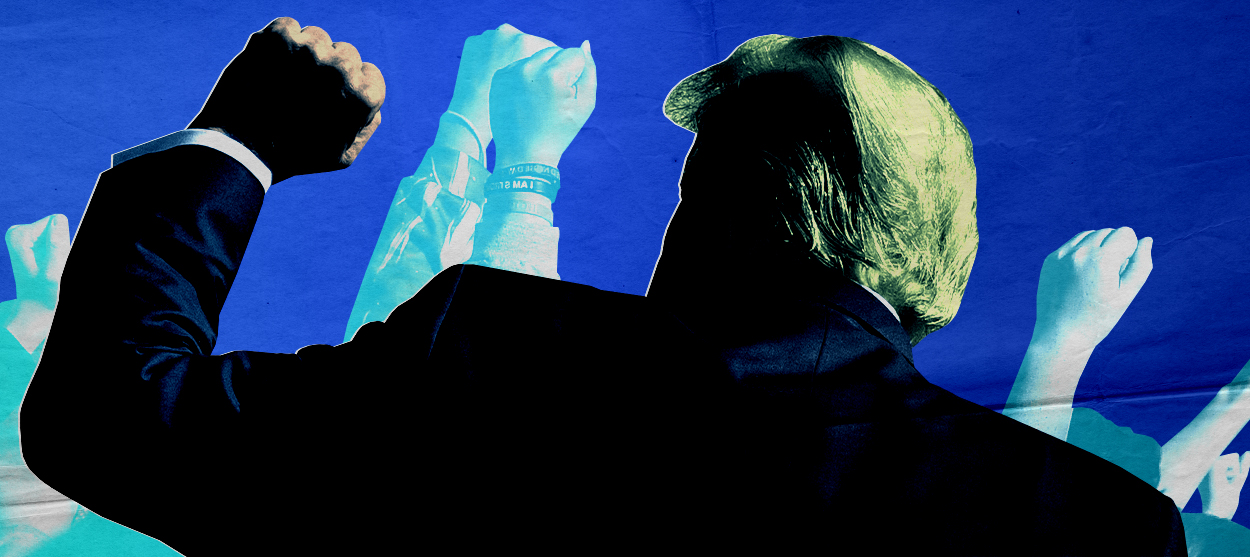How Trump is radicalizing the left
Trump is not the nemesis of "woke" zealotry. He's its best booster.


A free daily email with the biggest news stories of the day – and the best features from TheWeek.com
You are now subscribed
Your newsletter sign-up was successful
Among the weirder moments of this week's disastrous debate between President Trump and Democratic presidential candidate Joe Biden was the brief discussion of Trump's recent executive order banning racial sensitivity training that addresses "white privilege" or "critical race theory" at federal agencies. Trump offered an incoherent defense of the ban while Biden defended sensitivity training as a matter of respect. While this exchange undoubtedly left at least 95 percent of viewers scratching their heads, it touches on an issue that some people say has turned them into reluctant Trump supporters: His opposition to knee-jerk "political correctness" or "wokeness."
Trump's liberal critics regard his stance as pandering to aggrieved whites. Unlike them, I believe the leftist ideology of wokeness is in fact deeply pernicious and dangerous to liberal democracy. But I also believe hitching the "anti-woke" cause to Trump is the worst answer possible. Trump is not the nemesis of "woke" zealotry; he's its best booster. Tuesday's debacle shows why.
"Woke" ideology holds that racism, sexism, and other bigotries permeate everything in our culture and that we are entirely defined by "privileged" or "oppressed" identities. (This is also the essence of "critical race theory," mentioned in Trump's executive order.) If "privileged," we must constantly self-scrutinize to avoid perpetuating oppression — whether by inadvertently interrupting a Black person or a woman, complimenting an immigrant's English, mispronouncing a non-English name, wearing fashion "appropriated" from a minority culture, writing a poem in a "marginalized person's" voice, or expressing an opinion deemed harmful to an oppressed group.
The Week
Escape your echo chamber. Get the facts behind the news, plus analysis from multiple perspectives.

Sign up for The Week's Free Newsletters
From our morning news briefing to a weekly Good News Newsletter, get the best of The Week delivered directly to your inbox.
From our morning news briefing to a weekly Good News Newsletter, get the best of The Week delivered directly to your inbox.
This dogma, steeped in collective guilt and hypervigilant policing of speech and behavior, is destructive to individual freedom and to human relations. In a mind-boggling recent example, one white New York City community education board member was berated by another for briefly holding a Black child — a friend's nephew — in his lap during a Zoom meeting because it was deemed a hurtful expression of white dominance.
This toxic brand of supposed "anti-racism" also animates much of the "diversity training" material uncovered by Christopher Rufo, the conservative activist whose work led to Trump's executive order. Some of it sounds like a caricature of "woke" white self-flagellation, with white employees told to reflect on how they benefit from "white supremacy," how they may have "caused harm" to nonwhite co-workers, or whether the art displayed in their homes features too many white people. Even workshops that don't take such a strident approach often encourage people to view others solely as members of racial or gender groups. (There is also considerable evidence that such training is useless or counterproductive.)
"Woke" dogma has also become a powerful and often stifling presence in mainstream media, universities, schools, and other cultural institutions, as well as large sectors of the corporate world. So when reluctant pro-Trumpist Danielle Pletka, a fellow at the American Enterprise Institute in Washington, D.C., writes in The Washington Post that she fears "the virtue-signaling bullies who increasingly try to dominate or silence public discourse" and who "view every personal choice — from recipes to hairdos — through their twisted prisms of politics and culture," such concerns shouldn't be ridiculed or dismissed.
But is that a reason to vote for Trump — or another reason to vote against him?
A free daily email with the biggest news stories of the day – and the best features from TheWeek.com
What gives "wokeness" its cultural power is the widespread belief that it's a movement for equal human dignity and that opposition to it stems from racism, sexism, and other hate. Yet Trump is widely seen — and not just by the "woke" — as a man who traffics in bigoted and demeaning rhetoric. In an NBC/Marist poll in early August, two-thirds of American voters — including one-third of Republicans — said Trump's response to the recent protests against racial injustice had "mostly increased tensions," and only about a third of American voters saw him as the better candidate on handling race relations.
Trump's history provides ample reasons for this perception. His quest for the presidency was born from a one-man jihad to cast the first Black president of the United States as an African interloper. His 2015 presidential announcement featured the claim that most immigrants from Mexico were drug smugglers, criminals, and rapists. (Later, he accused an Indiana-born judge of Mexican descent of being biased against him because "he's a Mexican.") He has demonized Muslims and railed against admitting immigrants from "shithole countries" like Haiti. The very day Trump issued his executive order banning racial "stereotyping and scapegoating" in diversity training, he was scapegoating Ilhan Omar, the Democratic congresswoman from Minnesota, for her Somali refugee background. "She's telling us how to run our country," he told his supporters at a rally. "How did you do where you came from? How is your country doing?"
Because of this history, attacks on "wokeness" or "political correctness" from Trump can only backfire. Not only will they reinforce "woke" leftists in their conviction that their only opposition comes from racists and bigots; more importantly, they will alienate many liberals and moderates who dislike "political correctness" but dislike Trumpism even more and don't want to be in the same camp with racists. (And that's not to mention the hypocrisy of Trump posturing as a warrior for free speech while applauding physical violence against journalists or advocating prison for protesters who burn the American flag.)
There are other ways having Trump as president is a boon to "wokeness." For one, it lends some credibility to claims that white male supremacy in America remains deeply entrenched. (I know people online who lurched from center-left to far left after 2016, claiming their eyes have been opened to the truth about racism and patriarchy. I believe they are wrong — the reasons for Trump's election victory were far more complex—but such a trend does exist.) No less important, given the multifaceted disaster of this administration, complaints about college radicals, diversity consultants, and left-wing bloggers and Twitter activists are sure to be seen by many as a case of misplaced priorities.
The issue isn't simply that Trump is a bad ally for those who oppose "woke" zealotry because he's a bad person; it's that he's bad in specific ways that make him a counterproductive ally on this issue.
Tuesday's debate confirms this. When asked about the ban on "critical race theory"-based sensitivity training, Trump gave a rambling reply that showed he had no idea what he was talking about and was simply parroting things heard on Fox News. (The most specific he got was to say that such training "teaches people to hate our country.") Meanwhile, Biden's response, which stressed the importance of understanding other people's feelings and bringing people together, was far too benign a description of what happens at many workplaces in the name of "sensitivity" and "diversity." But for most Americans, it struck the right note on the underlying issues.
Those who argue that Trump deserves your vote because of his stance on the culture wars say that no one else is standing up to the left leviathan. But this is simply not true: Witness, for instance, the recent Harper's magazine letter signed mostly by anti-Trump liberals, denouncing leftist intolerance and defending open debate. (Full disclosure: I also signed this letter.) One could counter that Trump offers action instead of words. But even assuming that his ban on "stereotyping and scapegoating" in diversity training targets genuinely toxic programs, it only affects a small fraction of the workforce. Meanwhile, the inevitable backlash is likely to cause numerous public and private organizations to strengthen their commitment to diversity training — including the toxic kind.
It's indisputable that the far left has too much influence in today's Democratic Party. But Biden's victory as a moderate can give the saner and more sensible people a chance to regain ground in both major parties. White identity politics on the right and "woke" identity politics on the left feed off each other. A Trump victory would just perpetuate this vicious cycle.
Cathy Young is a columnist for Newsday and a contributing editor at Reason magazine. Her book Ceasefire!: Why Women and Men Must Join Forces to Achieve True Equality was published in 1999.
